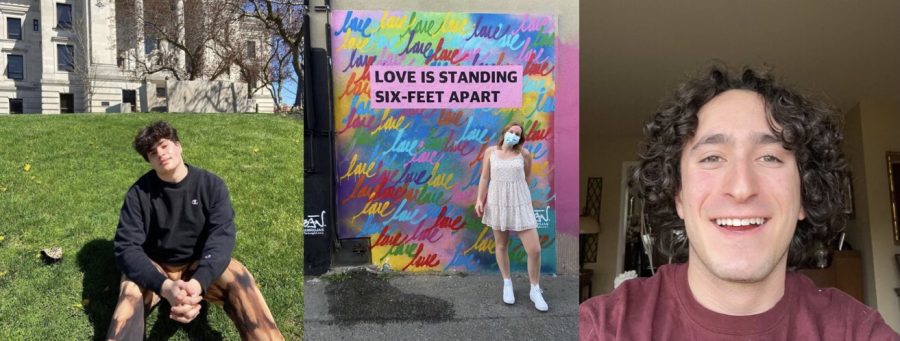Students of the LGBT community reflect on their experience at New Trier during LGBT history month
Seniors are inspired by activists to promote a change with the school’s advisery system
Grossman, Roche, Caplan
Seniors Joshua Grossman (left), Anika Roche (middle), and Michael Caplan (right) discuss desired changes at New Trier
With the annual month-long observance of LGBT history in October, members of the LGBT+ community, seniors Anika Roche, Michael Caplan, and Joshua Grossman, consider their own activism to advocate for additional change to destigmatize the community.
While Caplan and Grossman see more acceptance of LGBT+ within the New Trier community, they believe the school fails to see its flaws with the same sex advisery system.
“It is outdated, and erases the identity of our trans and non-binary students. The system corresponds with norms of the twentieth century, yet we are now in an era where people who do not fit into the gender norms of our society feel more comfortable to share who they are to others,” said Grossman. Grossman has not faced any outright discrimination in his advisery but has always felt disconnected since he does not relate with them like the heterosexuals in his advisery relates to each other.
“I call on New Trier to support LGBT+ students and I by changing the system and introducing all-gender advisories in the next few years, so that our LGBTQ+ student community feels validated, and supported in their identities and experiences,” said Grossman.
Caplan believes sex-segregated adviseries serve as a way to perpetuate heteronormative and cisnormative practices and severely disadvantages non-binary students.
“Had New Trier dissolved and reconfigured the advisory program, so many students’ high school experiences would have been more inclusive and the overwhelmingly harmful dynamic overshadowing walking into an adviser room every morning wouldn’t be so much of a problem,” said Caplan.
Roche thinks that there is a long way to go to fully destigmatize the LGBTQ community. She still hears slurs and stereotypes at school.
“I still hear people using the F slur all of the time. I was in my study hall the other day and these two kids walked by and I heard them say ‘AP art [F slur].’ I’ve also heard a lot of stereotypes, especially about IGSS. The people in IGSS are the sweetest people and people call them gay slurs all of the time. It’s really awful,” said Roche.
Caplan said New Trier feels very inclusive but there is still a lot of change that needs to be done. He is proud to represent his community but believes pride is much more important.
“Pride stands for all of the people along the way who lost their lives fighting for their rights. It stands for self-acceptance, accomplishment, and what’s still to come,” said Caplan.
Roche believes that education is extremely important for further understanding of the history and the progression of LGBT rights.
“You never get a magnified view of some of the histories of the minority group, so it’s very important to learn about it. It’s also important to know how these different movements have evolved in order to improve the amount of rights the LGBTQ people have,” said Roche.
Roche is inspired by trailblazers of the past, and current figures that are pioneering the LGBT+ movement in various aspects of life in society. She remembers learning about Matthew Shepard in American Studies, a gay student at the University of Wyoming who was beaten to death.
“We did a mini unit on his murder and I think a lot of the aspects on it are tragic, obviously the murder itself, but also some of the responses and some of the ways it was handled was hurtful for the LGBTQ community,” said Roche.
Grossman has noticed more people coming out and believes it is due to the actions of brave civil rights activists in history. He looks up to Ashley Diamond, an American transgender activist who sued the Georgia Department of Correction for housing her with male inmates and being denied hormonal therapy.
“I wish more people, LGBT+ and not, would realize that black transgender women like Marsha P. Johnson, and Ashley Diamond have led the fight for the equality of the LGBTQ+ community, it has not just been white gay men,” said Grossman.
Caplan also looks up to Marsha P. Johnson, who threw the first stones at the Stonewall riots in New York City. She is the first recognizable figure, and united the LGBT+ with the People of Color (POC) movement as a result of her intersectional inclusion messages.
“Bringing more light to the history and events will help people outside of the LGBTQ+ community see us as real people instead of stereotypes or numbers. Generally speaking, it has become less socially acceptable to be homophobic which is a good thing,” said Caplan.
Roche is also proud to represent the LGBT+ group although she is new to the community. She is surrounded by friends and teammates who have been supportive.
“In my dream world, no one would even acknowledge sexuality or even gender. Let people be who they are, love who they are, and love who they love,” said Roche.







































